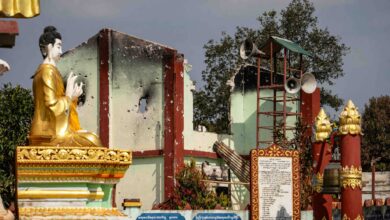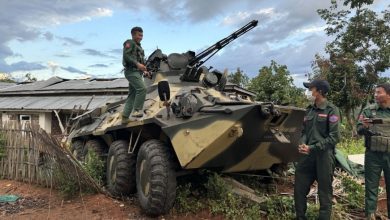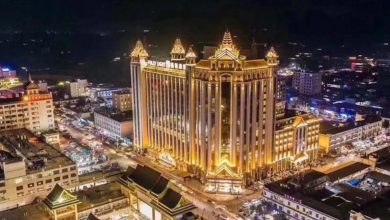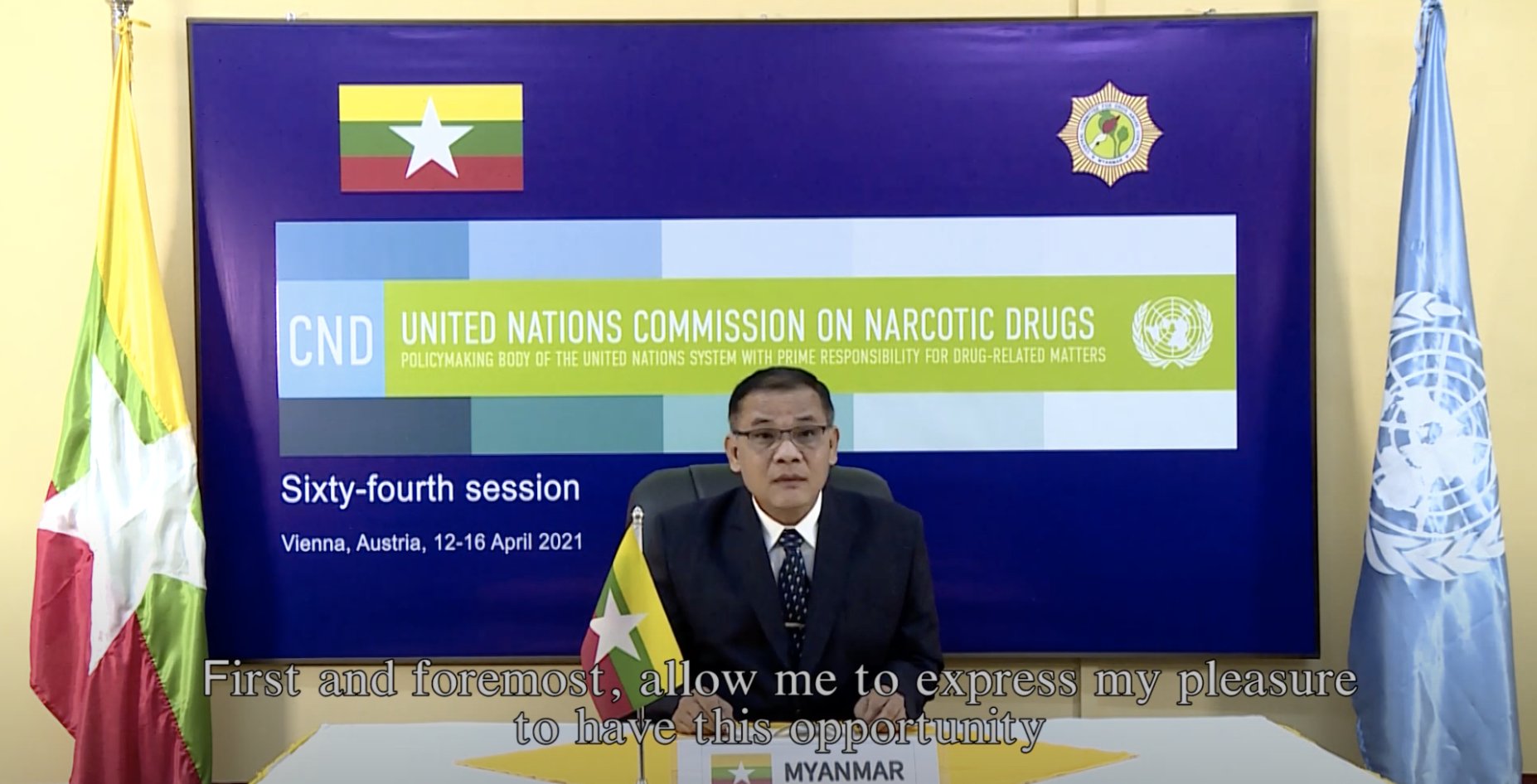
The staging of the 64th Session of the Commission on Narcotic Drugs (CND) from April 12-16 was the latest annual meeting for the Vienna, Austria-based United Nations Office on Drugs and Crime (UNODC), for which the CND serves as the governing body and provides policy guidance.
It would probably have passed out without much notice, except that it served as a coming out of sorts for Myanmar’s military junta.
The conference appears to signify the first time that a senior figure in Myanmar’s regime—in this case, Lt-Gen Than Hlaing—has participated in a UN forum since the February 1 coup.
As Myanmar’s newly installed deputy minister for home affairs, a department that controls both the police and the Special Branch, Lt-Gen Than Hlaing has played a central role in the ongoing violent crackdown that has seen nearly 3,600 people arrested and more than 766 killed in the country’s blood-stained streets.
In his remarks at the event, Lt-Gen Than Hlaing made no reference to the bloodshed carried out by the police under his command, preferring instead to focus on other things.
“Myanmar has made various efforts to eradicate drugs as a national duty. Special anti-drug operations are being carried out annually,” he said in a speech that was delivered remotely.
The fact that this year’s conference for the UNODC’s governing body was conducted online due to the Covid-19 pandemic spared the Austrian government the embarrassment of having to host a senior junta member officially blacklisted by both the European Union (EU) and the US for his role in the ongoing crackdown on anti-dictatorship protests.
“[P]olice forces acting under the authority of Lieutenant General Than Hlaing have committed serious human rights violations since 1 February 2021, killing civilian and unarmed protesters, restricting freedom of assembly and of expression, arbitrary arrests and detention of opposition leaders and opponents of the coup,” the EU’s sanctions announcement reads.
It goes on to describe Lt-Gen Than Hlaing as “directly responsible for decision making concerning repressive policies and violent actions committed by police against peaceful demonstrators and is therefore responsible for serious human rights violations in Myanmar/Burma.”
“Police forces acting under the authority of Lieutenant General Than Hlaing have committed serious human rights violations since 1 February 2021, killing civilian and unarmed protesters, restricting freedom of assembly and of expression, arbitrary arrests and detention of opposition leaders and opponents of the coup.”
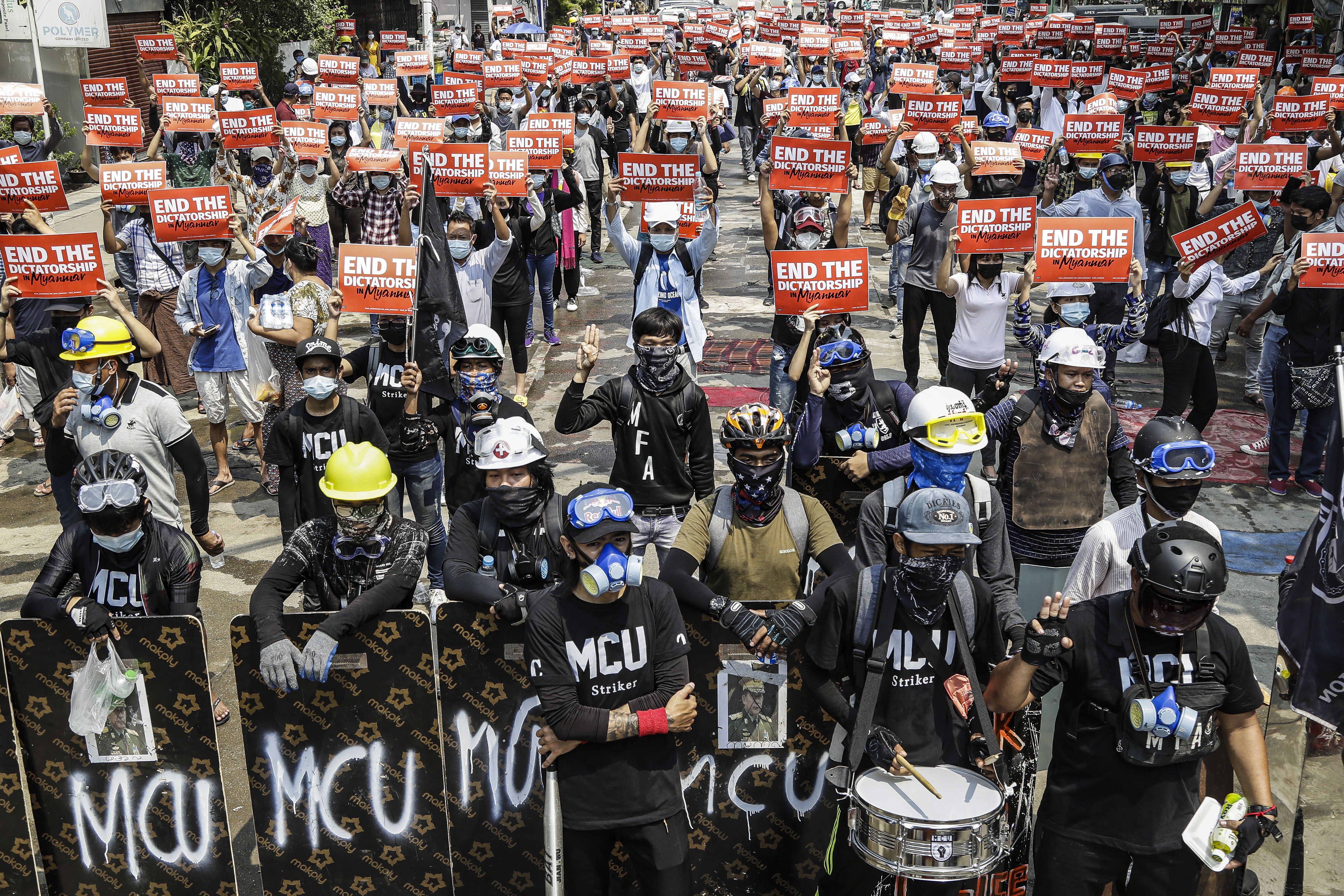
Dissonance within the UN interagency response
Despite what the EU, the British, Canadian and US governments—who have all sanctioned the senior junta figure—may think of Lt-Gen Than Hlaing, his participation at the CND was a victory for Myanmar military chief and coup leader Min Aung Hlaing in his ongoing effort to expel Ambassador Kyaw Moe Tun from his seat in New York as Myanmar’s Permanent Representative to the UN.
Kyaw Moe Tun has come out against the coup, much to the irritation of the junta, and refused to vacate his seat where he has continued to call on the UN and foreign governments to “consider the desire of the people.”
Ambassador Kyaw Moe Tun has maintained that he continues to represent Myanmar’s civilian government and that “the coup must fail,” triggering a diplomatic showdown that appears destined to be played out before the UN Credentials Committee, a nine-member body currently headed by Tanzania.
Myanmar dissidents are concerned that by giving a platform to Lt-Gen Than Hlaing, the UN is signaling that it has already decided to recognise the new junta and disregard Ambassador Kyaw Moe Tun.
Lt-Gen Than Hlaing’s participation at the CND conference, which was highly publicised in Myanmar military-run media, has also been perceived by some as signifying a change in the stance of UN Secretary-General António Guterres. Although the Secretary-General had previously claimed he was “appalled” by the junta’s crackdown on the Myanmar public, he took part in the CND alongside Lt-Gen Than Hlaing.
An April 29 statement released by the advocacy group Progressive Voice noted that 410 Myanmar civil society organisations and prominent activists denounced Lt-Gen Than Hlaing’s inclusion at the CND.
“The UN has not only failed to act as the brutal military junta commits crimes against humanity, it is now acting to legitimize and offer a platform to those who are murdering innocent people by the hundreds, including children,” read the statement. “It is disheartening to see such lack of respect for human rights displayed by the very institution that is mandated to protect and encourage respect for human rights. It is all the more shocking to see a UN institution with a mandate to prevent crime, corruption and terrorism feting an international criminal.”
As the UNODC’s governing body, the CND reports to and is one of the functional commissions of the Economic and Social Council (ECOSOC). The ECOSOC is itself under the UN General Assembly, where Kyaw Moe Tun continues to sit. It remains to be seen how the struggle between Kyaw Moe Tun and the Myanmar junta will play out across other UN agencies and departments.
“The UN has not only failed to act as the brutal military junta commits crimes against humanity, it is now acting to legitimize and offer a platform to those who are murdering innocent people by the hundreds, including children.”
When reached for comment for this article, Jeremy Douglas, the UNODC’s regional representative for Southeast Asia and the Pacific, explained that the UNODC was not responsible for the inclusion of Lt-Gen Than Hlaing at the CND.
“Invitations to the 2021 CND were sent to all UN MSs [Member States] sometime in 2020 by UN HQ [headquarters] as they are for all other UN commissions,” Douglas wrote in an email.
According to Douglas, Lt-Gen Than Hlaing and other Myanmar participants’ names were submitted by Myanmar’s ambassador to Vienna, Min Thein, who, in addition to being accredited to Austria, serves as Myanmar’s representative to the UN offices based there.
While invitations to states may have been sent last year, online registration for individuals representing those states at the conference appears to have taken place from late March until early April—well after Myanmar’s coup, and Lt-Gen Than Hlaing’s February 2 appointment to his position.
“The composition of Myanmar’s delegation was known to the UN in New York HQ before the CND as they received confirmation of the nominations, as was the UN Resident Coordinator and UN system in Myanmar,” Douglas said.
He noted that “the participation of the delegation does not in any way indicate a change in the position of the Secretary General or the UN in Myanmar, the region or globally, including UNODC, OHCHR etc.,” Douglas added.
In his correspondence, Douglas did not elaborate on what this position entailed.
“The participation of the delegation does not in any way indicate a change in the position of the Secretary General or the UN in Myanmar, the region or globally, including UNODC, OHCHR etc.”
Apart from ignoring the advice of Ambassador Kyaw Moe Tun, who has maintained that the military coup council is illegitimate, Lt-Gen Than Hlaing’s inclusion at the CND also defies the recommendations of the UN Secretary-General’s own Special Envoy for Myanmar, Christine Schraner Burgener. She has called on the international community to “not lend legitimacy or recognition to this regime.”
Schraner Burgener’s comments were echoed by Progressive Voice, who have demanded that the UNODC and CND to “immediately end all ties with the illegitimate military junta and recognize and work with the National Unity Government, the legitimate governing body representing the people of Myanmar.”

No acknowledgment of the coup
Public comments by UNODC staff since Myanmar’s coup have largely overlooked the violence perpetrated against the public by the police and military forces. They have instead focused on what the UNODC believes are the ramifications of the situation in Myanmar for the global drug trade.
The UNODC’s Douglas explained to Channel News Asia, a Singaporean broadcaster, in a February 26 interview that the UN drug agency was concerned that what he referred to as the “redeployment” of security personnel could sideline anti-drug interdiction efforts.
“What we do sense is that law enforcement redeployment, which is occurring within the country because of the emergency decree, may position the police to new places, meaning that they’re not able to do what they would normally do. Search for drugs, follow-up investigations, so it could be a huge distraction which traffickers can take advantage of. So we’re expecting that type of behaviour, opportunistic behaviour, to take place, which is very normal for organised crime,” he said.
In another interview with AFP on March 26, Douglas predicted an increase in synthetic drug production due to the economic slowdown brought about by the coup.
“The best way to make big money fast is the drug trade, and the pieces are in place to scale up,” Douglas explained.
Similarly, a UNODC press release issued on February 11 about Myanmar also made no mention of the military’s seizure of power. It was an omission that the agency’s many Myanmar critics have attributed to UNODC’s partnership with the very police reinforcing the coup.
These critics have also suggested that the agency’s consistently dire predictions about surges in drug production and distribution are indicative of the UNODC’s own struggle for relevance and renewed funding in a region where the agency’s police partners have been accused of rights abuses, incompetence and collaboration with the very drug traffickers they are supposed to be fighting against.
“The best way to make big money fast is the drug trade, and the pieces are in place to scale up.”
According to an independent evaluation of the UNODC’s Myanmar Country Programme published in May 2020, the agency’s budget during a multi-year project period beginning in 2014 was listed US$42 million. It had reportedly managed to raise just over half of this amount.
The evaluation also noted that at the time the Myanmar program was designed, it was “not developed within the framework of conflict-sensitive and ‘do no harm’ programming,” pointing out that this was “not common practice for UNODC programming.” This was a requirement only added by the UN in 2018 to meet the 2030 Agenda for Sustainable Development.
Pro-military bias and major reporting errors
In early 2020, the office of military chief Min Aung Hlaing announced that during raids in northern Myanmar, security forces had seized over 143 million methamphetamine tablets, 441 kg of crystalline methamphetamine and vast amounts of chemicals and laboratory equipment used in drug production.
The UNODC heralded the raids and described the operations as the largest ever methamphetamine manufacturing bust in the Golden Triangle.
“What has been unearthed through this operation is truly off the charts,” the UNODC’s Douglas said at the time of the bust, which took place in northern Shan State’s Kutkai Township.
Despite the headlines, it has been unclear how many people have been charged with crimes in connection with the raids, or whether the figures provided by Myanmar officials concerning the seizure were accurate.
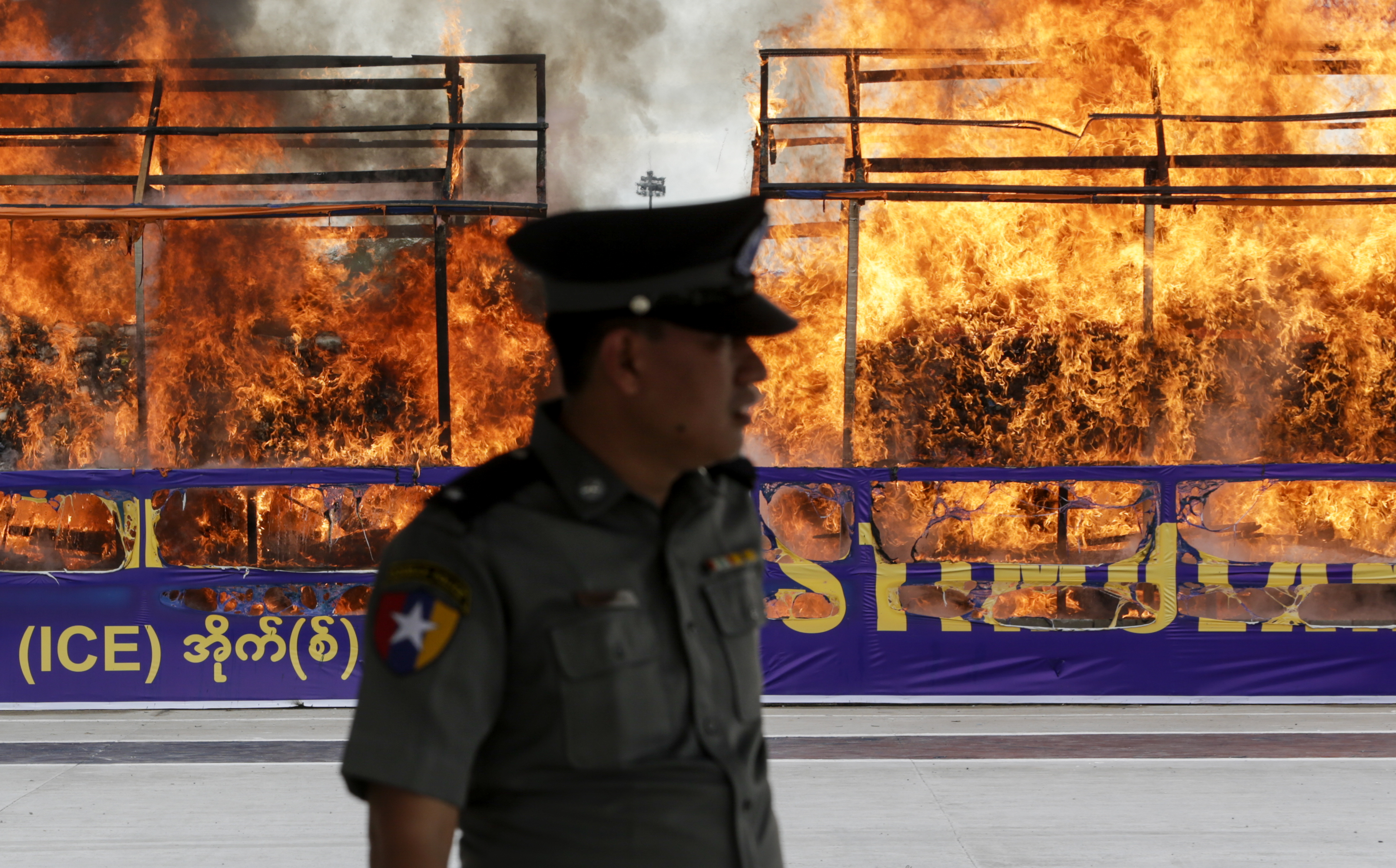
Unsurprisingly, in his remarks at the April conference in Vienna, Lt-Gen Than Hlaing did not provide updates on any outcomes related to the supposedly giant drug haul in Kutkai. He instead focused on the results of the latest annual joint opium survey conducted by the UNODC and Myanmar’s Central Committee for Drug Abuse Control. The committee is a government entity that, until the coup, was headed by Myanmar’s previous police chief, Pol Lt-Gen Aung Win Oo.
The UNODC’s annual reports concerning Myanmar have come under criticism for demonstrating a pro-military bias that ignored realities on the ground and appeared to reinforce the military’s agenda.
For example, the UNODC claimed in its 2018 Myanmar Opium Survey that, “in Kachin State, the highest density of poppy cultivation took place in areas under the control or influence of the Kachin Independence Army (KIA).”
This conclusion contradicted the actual data collected in the surveys, including the maps printed in the report which showed that Kachin State’s opium fields were in territory controlled not by the KIA but by the Border Guard Force—units officially under the control of the Myanmar military.
As the Kachin Independence Organization (KIO) pointed out in a strongly worded letter to the UNODC’s Douglas rebutting the report, “It can be clearly seen that the very high opium density area in Sadung lies in the government-controlled BGF area, and not in the KIA area.”
“Frankly, siding with the Myanmar government to cast unsubstantiated aspersions against the KIA will only hinder, not support, peace-seeking efforts,” the KIO warned the UN drug agency.
The area that the KIO was referring to has long been the fiefdom of the Myanmar military-allied militia leader Zahkung Ting Ying, who originally split with the group in 1968. The veteran warlord was described by a US counter-narcotics official in 1997 Senate testimony as “someone associated with drug trafficking.” It is a view shared by members of the Kachin State-based anti-drug movement Pat Jasan who have protested in front of the former parliamentarian’s home and dispatched vigilantes to destroy poppies in BGF territory.
“Frankly, siding with the Myanmar government to cast unsubstantiated aspersions against the KIA will only hinder, not support, peace-seeking efforts.”
As the Transnational Institute (TNI), an Amsterdam-based think tank that has criticised the KIO for being too heavy handed in its drug control efforts, noted, “Our local sources […] confirm the KIO claim that there is presently no substantial opium cultivation in KIO-controlled areas.”
TNI went on to say that “it is unclear how the UNODC arrives at its completely opposite claims about Kachin State, but it seems to be based on wrong assumptions about who ‘controls’ which areas.”
Thanks to Lt-Gen Than Hlaing’s central role in the junta’s war on Myanmar’s civil society, the next time the UNODC makes such errors in its reports there may be no one on the ground in Myanmar to point them out.
